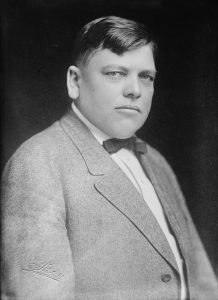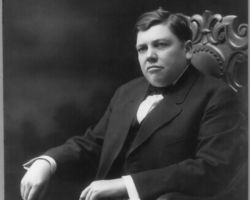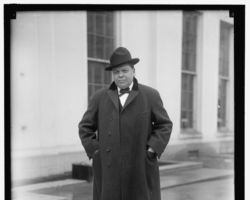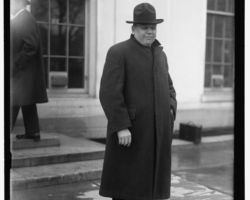1866 – 1917
Inducted 2008
“His brief but colorful life was marked by accomplishments on behalf of working men and women and the conservation of natural resources.” — WCHF
Paul Oscar Husting went duck hunting one day around 1913 on the Rock River in Horicon Marsh. He was arrested for trespassing by a private shooting club, which claimed the rights to the water, near Husting’s home in Mayville. The case went all the way to the Wisconsin Supreme Court, which ruled in favor of Husting.
The decision strengthened emerging law in Wisconsin that established the public trust doctrine, giving rights to Wisconsin’s navigable waterways to the public. The court established that ordinary high-water marks determined navigability. This standard continues to define state permit jurisdiction and public waters protection for many activities. Husting’s trespass was no accident. He was long an advocate of the public’s interest in Wisconsin’s navigable waters.
Husting’s brief but colorful life was marked with accomplishments and work on behalf of working men and women and the conservation of natural resources. As a state senator, he championed the rights of the workers, supporting safe workplace conditions, worker’s compensation, laws that protected the rights of women workers and other workplace laws that gave citizens rights and protections. But he was equally active in efforts to protect the state’s natural resources.
His populist appeal helped Husting to be the first U.S. senator from Wisconsin to be elected by popular vote. His work at the national level also focused on protecting the rights of working people and also protecting natural resources. He tried unsuccessfully to defeat the Shield Act that allowed private interests to capture valuable water power sites.
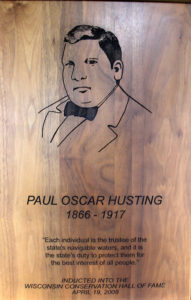 Born in Fond du Lac, Husting was the grandson of Solomon Juneau, founder of Milwaukee. The family moved to Mayville when he was a child, and he grew to love duck hunting in the nearby Horicon Marsh. Described as strong-willed and tenacious, Husting showed those traits early in life. He left school after eighth grade rather than wear a uniform required by school administration.
Born in Fond du Lac, Husting was the grandson of Solomon Juneau, founder of Milwaukee. The family moved to Mayville when he was a child, and he grew to love duck hunting in the nearby Horicon Marsh. Described as strong-willed and tenacious, Husting showed those traits early in life. He left school after eighth grade rather than wear a uniform required by school administration.
He held jobs in Mayville that included store clerk and postmaster before moving to Madison in 1895 to study law. He returned to Mayville in 1897 to practice law. Elected district attorney in 1902. He earned a reputation as a fair-minded public official who was concerned both with justice for all and the rights of the individual.
Elected to the state Senate in 1906, he quickly championed improved social conditions for citizens and protection of natural resources. His tenure was marked by battles with waterpower interests that sought freedom to develop large dams in the state. He co-authored three Water Power Acts that gave the state compensation and rights to recapture water power improvements after a specified period. Water-power interests fought these efforts in the legislature and the courts, but Husting and other advocates of public rights were able to craft laws that stood up in court and served the public interest.
He also led efforts to change Wisconsin’s system of choosing U.S. senators, removing that power from political parties and putting it in the hands of the people through direct vote. Elected to the U.S. Senate in 1914, his backing of President Woodrow Wilson’s foreign policies cost him support among Wisconsin’s burgeoning German population.
A duck hunting accident on Rush Lake near Pickett in 1917 ended the life of one of Wisconsin’s earliest conservationists.
Resources
Paul Oscar Husting Legislative Citation
A Historic Hunt Protects Public Water Rights, article by Bill Volkert for Wisconsin Natural Resources Magazine, 2012
Paul Husting Memorial Address delivered in the Senate and House, 1919
Report: Water Powers, Foresty and Drainage, by Paul Husting and Henry Krumby, 1910
Letters of Paul O Husting concering the Present Crisis, from Wisconsin Magazine of History via JSTOR, 1915
Paul O. Husting on Wikipedia
Photos
These images may be used under the Creative Commons Attribution-NonCommercial-NoDerivatives 4.0 International License.

